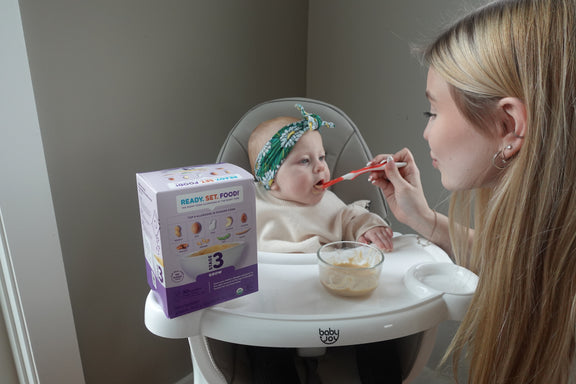The new USDA 2020 Dietary Guidelines (DGA) were just issued today by the U.S. Department of Agriculture (USDA) and the U.S. Department of Health and Human Services (HHS) to help provide Americans with recommendations on food and beverage choices. This 2020-2025 edition marks the first time the DGA offers specific recommendations for infants and toddlers, or from birth to 2 years of age. These recommendations will help shape the choices and decisions that parents make for their children and families. Because of the importance of these recommendations for families, we’ve provided our guide to the 2020-2025 DGA with our top 5 takeaways for parents and children from birth to 23 months.
Top 5 Takeaways for Parents from the USDA 2020 Dietary Guidelines
1) “Introduce Infants to Allergenic Foods” - Allergenic foods such as peanuts, egg, cow milk products, tree nuts, wheat, crustacean shellfish, fish, and soy should be introduced in an infant’s diet. However, “if an infant has severe eczema, egg allergy, or both (conditions that increase the risk of peanut allergy), age-appropriate, peanut- containing foods should be introduced into the diet as early as age 4 to 6 months.” It’s important to note that the DGA does discourage against introducing nuts and chunks of peanut butter as they “can be a choking risk for young children.” For more tips on introducing foods safely, visit the USDA here.
Learn more about the USDA Guidelines from FOX17 featuring Board Certified Allergist Katie Marks-Cogan, M.D.:
2) “Encourage a Variety of Foods” - To encourage healthy nutrition, parents should offer foods from all food groups. It’s important to note that it may take up to 8 to 10 exposures for an infant to accept a new type of food. Continuing to offer a variety of foods on multiple occasions will help encourage healthy eating and “a nutrient-dense, diverse diet from age 6 through 23 months of life.”
3) “Avoid Added Sugars” - There is no room in an infant or toddler’s diet for added sugars because of the importance of every bite to meet their high nutrition requirements relative to the amount of foods they consume. In addition, lasting taste preferences are being shaped during this critical time period and if added sugars are introduced often, then children may develop a strong preference towards overly sweet foods.
4) “Responsive Feeding” - Responsive feeding is “a feeding style that emphasizes recognizing and responding to the hunger or fullness cues of an infant or young child.” Below are some important cues to be aware of to indicate your child’s hunger or fullness and to help them self-regulate their appetite.

5) “Feed Infants Human Milk for the First 6 Months, If Possible” - Breastfeeding represents the ideal form of nutrition for your baby and should support most of your baby’s nutrition needs, from birth through about age 6 months. However, if breastfeeding is not an option for your baby, the DGA recommends choosing an “iron-fortified commercial infant formula (i.e., labeled “with iron”) regulated by the U.S. Food and Drug Administration (FDA)."

The Window Of Opportunity For Introducing Peanut: New Study Findings From the LEAP and EAT Trials
Results from the landmark LEAP and EAT studies have shown that intr...

Best Finger Foods For Babies (And When To Start Finger Foods)
When to move beyond the spoon and start baby's journey with finger ...

6 Reasons Why You Should Introduce Allergens
Landmark studies and medical guidelines recommend that you introduc...

7 Ways to Feed Your Toddler More Iron
Iron is an essential mineral for your toddler’s brain health and ov...

How To Know If My Toddler Is Getting Enough Protein?
Protein supports your toddler’s growth, helps build strong bones an...

How Much Milk Should Your Toddler Drink?
How much milk should your toddler drink in a day? Find out the reco...
All health-related content on this website is for informational purposes only and does not create a doctor-patient relationship. Always seek the advice of your own pediatrician in connection with any questions regarding your baby’s health.
These statements have not been evaluated by the Food and Drug Administration. Products are not intended to diagnose, treat, cure or prevent any disease. If your infant has severe eczema, check with your infant’s healthcare provider before feeding foods containing ground peanuts.







